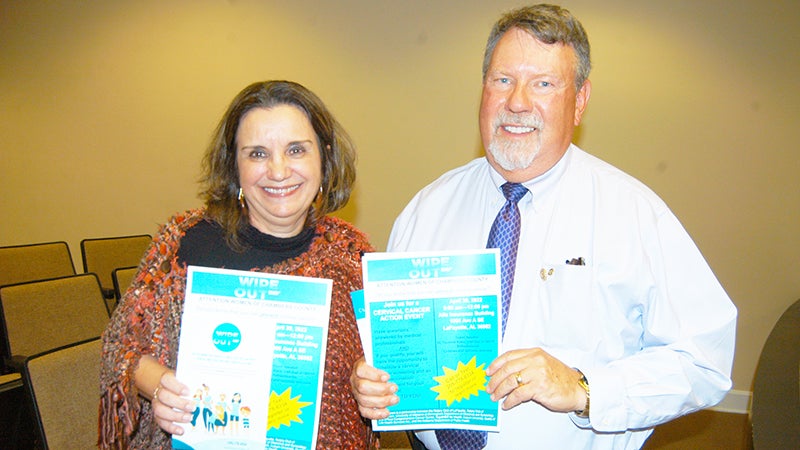Chambers County has the highest rate of cervical cancer in Alabama
Published 9:00 am Thursday, April 21, 2022

- Talking cervical cancer: Dr. Donald Busby (at right) and Dr. Isabel Scarinci (at left), UAB’s senior advisor for globalization and cancer, spoke to the Lanett City Council on Monday about an effort to help wipe out cervical cancer in Chambers County. Photo by Wayne Clark.
|
Getting your Trinity Audio player ready...
|
LANETT — There was a good news-bad news topic discussed at the Monday meeting of the Lanett City Council. The bad news is that Chambers County currently has Alabama’s highest rate for cervical cancer. The good news is that an action plan is about to be put in place that’s designed to wipe out one of the most preventable kinds of cancer in the local area.
Dr. Donald Busby of LaFayette and Dr. Isabel Scarinci of UAB discussed Operation Wipe Out, an event that will take place at no cost to the women who participate. It will be taking place from 9 a.m. until noon CDT (10 a.m. until 1 p.m. EDT) on Saturday, April 30 at the ALFA Building on the east side of LaFayette. Dr. Tavonna Kako of the UAB Department of Obstetrics and Gynecology (OBGYN) will be speaking, refreshments will be served and children and spouses are welcome.
Up to 240 women can take part in the free and potentially life-saving program. Call or text (205) 778-8334 to register or to learn more. Those who qualify will have the opportunity to schedule a cervical cancer screening and an HPR vaccination appointment for their children. This will be available at no cost to the participant.
Operation Wipe Out is a partnership between the Rotary Clubs in LaFayette and Birmingham, UAB’s OBGYN Department and the O’Neal Comprehensive Cancer Center, TogetHER for Health, Auburn University, Quality of Life Health Services, Inc. and the Alabama Department of Public Health.
“I am hoping and praying that a lot of women come to this,” said Dr. Busby. “Where there is a high rate of cervical cancer, not enough women are being screened.”
Alabama has one of the highest cervical cancer rates in the U.S. and Chambers County currently has the state’s highest rate. Clearly, there is a need for a Wipe Out effort.
Cervical cancer is a devastating disease that not only impacts a woman’s life but also her entire family and community. Many women have cervical cancer in their 30s, 40s and 50s, which is younger than the onset of many other cancers.
Dr. Scarinci is a native of Brazil, where she survived polio as a child. She has been in the U.S. for the past 33 years. She is a behavioral scientist with a deep commitment to the elimination of cancer disparities in the U.S. and in low- and middle-income countries. The focus of her work is on the application of behavioral science to public health by promoting behavior change at the population level.
Having more screening for cervical cancer and more HPV vaccination is one way of doing this.
HPV, or human papillomavirus, causes nearly all cervical cancers in women, and it can also affect men who can get throat or mouth cancer from HPV. According to the Centers of Disease Control (CDC), roughly 44 percent of the HPV-associated cancers between 2014-18 occurred in men.
A vaccine is available that can prevent HPV infection and consequently prevent cervical cancer and other HPV-associated cancers. This vaccine is very safe and is covered by most health insurance plans. The vaccine is most effective when it is administered to children before they have been exposed to the virus. Boys and girls who are in the 11-to 12-year-old age group should get this vaccine when they are getting their other routine vaccinations. Children as young as nine can receive the HPV vaccination.
Studies have shown the vaccine provides close to 100 percent protection for the targets of HPV.
“We encourage parents to see that their children are vaccinated for this,” Scarinci said. “There is some new data we are excited about. It’s telling us that one dose will be sufficient. UAB was a test site for this 20 years ago. At the time, we thought it was for adults. We now know that it’s for kids, too. An estimated 80 million people in the U.S. have been vaccinated. I am here in Chambers County today because it’s number one on the list for cervical cancer.”
A high cervical cancer rate almost certainly means a low screening rate.
“Cervical cancer and colorectal cancer are the two types of cancer that can be prevented,” Scarinci said.




